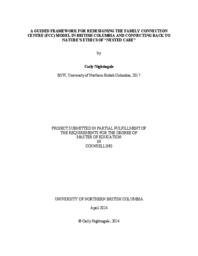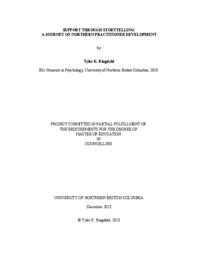Linda O'Neill
Person Preferred Name
(none provided) (none provided)
Related Works
Content type
Digital Document
Description / Synopsis
In October 2021, the Ministry of Children and Family Development (MCFD) announced a new centralized hub model in British Columbia branded as Family Connection Centres (FCCs) that would replace and eliminate the Autism Funding Program by the Spring of 2025. While the intentions of FCCs are to create a new model of care that is designed to support children and youth from birth up to nineteen years of age with developmental challenges and create easier access and navigation of services for families and caregivers, it has not come without its share of significant concerns from professionals and communities across BC. The intent of this research project is to provide a guided framework to address the concerns that have been raised and include important recommendations from Foundry, a well-established youth agency in BC, as well as incorporating essential ethics from nature that will help to design a better agency structure and model. The proposed framework will focus on building from existing services and unique family networks, as well as connecting back to land and nature, to support and raise healthy children and create strong, connected familial communities.
Origin Information
Content type
Digital Document
Description / Synopsis
In the challenging mental health landscape of Northern British Columbia, a tale of connection unfolds - a narrative woven into the fabric of rural life that binds practitioners in a shared struggle for support. The complexities of care within this region, marked by the culmination of multiple health crises, have stressed the importance of centralizing practitioners as the protagonists within this story of social wellness. A need for meaningful clinical support has arguably never been greater, rising in response to the contextual needs of an often-isolated workforce, generally lacking specialized training in counselling processes. This story delves into the complex, fragile relationships that compose a Northern system of care, shaped by a unique socio-cultural climate and held in place by a tenuous thread. While acknowledging the scarcity of empirical evidence on the counselling experience in rural settings, this narrative draws on the value of engaging Northern practitioners’ voices in shifting supportive service delivery. In the quest for professional growth and competency, clinical supervision has materialized as a crucial collaborator in supporting professional practice, recognizing the invaluable position of developmental location in bridging the theory-to-practice divide. The following project seeks to redress these disconcerting discrepancies by providing an avenue to access and interpret helpers’ experiences, facilitating ongoing growth and development as conceptualized within an integrated developmental framework. Stories unfold as particularly salient means to aid this process of exploring practitioners’ developmental trajectories, fostering understanding, validating experiences, and unravelling complex elements of practice. This resource attempts to tap into this profound power of story to aid clinical supervisors in empowering practitioners, conceptualizing the process, and assisting helpers in navigating their nuanced narratives as they embark upon their journey of self-discovery in hopes of helping others.
Origin Information


